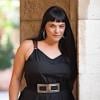
Trade and Mary Motorhead are a pair of cutting-edge chamber operas by Irish composer Emma O’Halloran that combine the desperate isolation of Samuel Beckett with the visceral working-class grit of Trainspotting. The double bill also represents the latest collaboration between Beth Morrison Projects and Los Angeles Opera. It is a mutually beneficial partnership that has helped support BMP’s adventurous development of new work while offering LA Opera a chance to leave the Dorothy Chandler Pavilion and present edgier productions in smaller venues, in this case the Roy and Edna Disney CalArts Theater (REDCAT).
Trade/Mary Motorhead was initially developed as O’Halloran’s award-winning submission to BMP’s 2018 Next Generation competition and completed during the isolating period of the pandemic shutdown. Both operas tell intimately troubling stories of people at odds with the world around them, struggling to make sense of the demons that drive them, and the bomb-like explosions their instability ignites. The knife-edge librettos for both operas were written by Mark O’Halloran (the composer’s uncle), adapted from his plays of the same name.

The result is a remarkable fusion that joins the dramatic craftmanship of a skilled playwright with music that interweaves whole-tone and microtonal acoustic instrumentation with an electronic score that blasts irradicably one moment and pulsates to a techno beat the next. It’s melodic and off-kilter, like the interior of a brain about to go up in flames.
Much like his fellow Irish playwright (and filmmaker) Martin McDonagh, Mark O’Halloran creates characters that are multifaceted in their emotional motivations, extreme in their outbursts, and desperate to make some form of human connection that will allow them to come to peace with who they are — whether it’s Mary Motorhead locked away in Mountjoy Prison, explaining why she plunged a knife into her lover’s skull, or a young male hustler and his older mark baring their souls, as well as their flesh, during a sexual encounter in a seedy hotel room in north Dublin.
Equally important is the pinpoint direction by Tom Creed. Having previously staged both of O’Halloran’s plays, he came to the project already possessing an intimate knowledge of the material. But as Creed explained in a post-performance discussion, what he discovered when he heard the words sung, accompanied by the full spectrum vocabulary of Emma O’Halloran’s music, allowed him to raise the drama to a whole other level.
The role of the rebellious badass known in the rough bars and dives of Dublin as Mary Motorhead was composed specifically for mezzo-soprano Naomi Louisa O’Connell. She is a singer/actor of amazing range, considering she also starred in a 2012 West End production of Terrence McNally’s Master Class.
Even when she’s standing still, there is a tiger just beneath the surface, waiting to pounce. And pounce she does, in a gushing monologue during which she unpacks the raw hand Dublin dealt her, a succession of binge drunks, white-powder highs, and clutching sex.
As Mary’s tale unfolds, her drab cell ignites in a blast of disco lights and electronic pulsations. She hooked up with Red, a guy she knew was bad news. Drugged out, sexed out, and flipped out, she split open his skull with a knife to see who he really was and if the real her was in there, too.

In Trade, the seedy hotel room is both a sanctuary and a cell. The Older Man (Marc Kudisch) and Younger Man (Kyle Bielfield) have come together to renew a homosexual encounter. The young hustler leads a secret domestic life with a wife and child, while the middle-aged man, a father, has kept his homosexuality closeted.
The brilliantly balanced performances by Kudisch and Bielfield unfolded in a fraught realm of claustrophobic sexual/emotional/confessional tension. One moment, the scenario is all about role-playing, a sex-for-money ritual of dominance and submission. The next, it is psychological exorcism.
Creed choreographs the encounter like a dance where the partners change leads and steps but never touch. It is not until the climactic moment that they finally embrace. But when it comes, it’s not sex.
The 10-member ensemble led by Elaine Kelly, the electronic sound design by Alex Dowling, and the floating-world set design, costumes, and lighting by Jim Findlay, Montana Levi Blanco, and Christopher Kuhl all contributed to making the performance opera-theater at its best. Whatever comes next from Emma O’Halloran, it cannot come soon enough.




